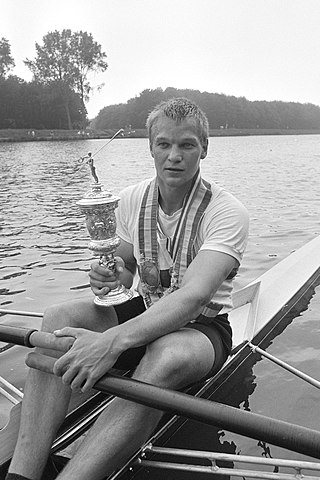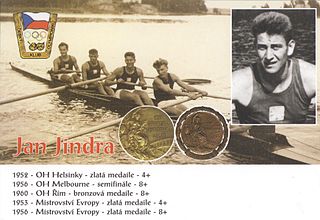
The men's single sculls competition at the 2004 Summer Olympics took place at Schinias Olympic Rowing and Canoeing Centre, Greece. The event was held from 14 to 21 August and was one of six events for male competitors in Rowing at the 2004 Summer Olympics in Athens. There were 29 competitors from 29 nations, with each nation limited to a single boat in the event. The event was won by Olaf Tufte of Norway. Silver went to Jüri Jaanson of Estonia, with bronze to Ivo Yanakiev of Bulgaria. It was the first medal in the men's single sculls for all three nations. Marcel Hacker's failure to make the final made this the first men's single sculls race since 1956 without a German rower on the podium; between the United Team of Germany, East Germany, West Germany, and Germany, the German medal streak in the event had been 11 Games long.

The men's eight competition was one of six events for male competitors in Rowing at the 2004 Summer Olympics in Athens. It was held from 15 to 22 August. There were 9 boats from 9 nations, with each nation limited to a single boat in the event. The event was won by the United States, the nation's first victory in the men's eight since 1964 and 12th overall. The Netherlands took silver. Australia, the reigning silver medalist, finished with bronze this time.

The men's single sculls event was a rowing event conducted as part of the Rowing at the 1964 Summer Olympics programme. It was held from 11 to 15 October at the Toda Rowing Course. There were 13 competitors from 13 nations, with each nation limited to a single boat in the event. The event was won by Vyacheslav Ivanov of the Soviet Union, his third consecutive victory in the event. Ivanov's three gold medals in the event remains tied for the best results for any individual single sculler ; only Ekaterina Karsten has more medals in (women's) single sculls, though she took only two golds along with a silver and a bronze. The second spot on the podium was also a repeat of 1960; Achim Hill of the United Team of Germany became the sixth man to win multiple single sculls medals by repeating as silver medalist. Bronze this time went to Gottfried Kottmann of Switzerland, that nation's first medal in the event since 1924.

The men's coxed pair event was a rowing event conducted as part of the 1964 Summer Olympics programme. It was held from 11 to 15 October. There were 16 boats from 16 nations, with each nation limited to a single boat in the event. The event was won by American crew Edward Ferry, Conn Findlay, and coxswain Kent Mitchell. Findlay had been on the United States gold medal crew in 1956 and bronze medal crew in 1960; he was the first man to earn two gold medals in the event, as well as the first man to win three medals of any color in the event. Mitchell had also been on the 1960 crew, and was the seventh man to earn multiple medals in the coxed pair. Jacques Morel, Georges Morel, and cox Jean-Claude Darouy took silver to earn France's first medal in the event since 1952. Herman Rouwé, Erik Hartsuiker, Jan Just Bos earned what was formally the Netherlands' first medal in the event; a pair of Dutch rowers had won the first edition in 1900, but had jettisoned their cox in favor of a local French boy between rounds and thus that medal was a "mixed team" medal.
The men's K-4 1000 metres event was a fours kayaking event conducted as part of the Canoeing at the 1972 Summer Olympics program.

The men's single sculls competition at the 1968 Summer Olympics took place at Virgilio Uribe Rowing and Canoeing Course, Mexico. The event was held from 15 to 19 October. There were 17 competitors from 17 nations, with each nation limited to a single boat in the event. The event was won by Jan Wienese of the Netherlands, with Jochen Meißner of West Germany taking silver and Alberto Demiddi of Argentina earning bronze. It was the first medal in men's single sculls for each of the three nations. The Soviet Union's four-Games winning streak in the event ended; three-time champion Vyacheslav Ivanov was left off the team in favor of Viktor Melnikov; Melnikov finished fourth in his semifinal and did not reach the main final.

The men's single sculls competition at the 1988 Summer Olympics took place at Misari Regatta, South Korea. The event was held from 19 to 24 September. It was the 20th appearance of the event, which had been held at every Olympic Games since the introduction of rowing in 1900. NOCs were limited to one boat apiece; 22 sent a competitor in the men's single sculls. Thomas Lange of East Germany won the event, denying Pertti Karppinen a record fourth-straight win and starting a two-Games winning streak of his own. Peter-Michael Kolbe of West Germany took his third silver, joining Karppinen and Vyacheslav Ivanov as three-time medalists in the event. New Zealand earned its first medal in the event since 1920, with Eric Verdonk taking bronze.

The men's sprint event at the 1980 Summer Olympics took place on 23–26 July 1980 in Krylatskoye Sports Complex Velodrome. There were 15 competitors from 15 nations, with three additional non-starters. The event was won by Lutz Heßlich of East Germany, the nation's first victory in the men's sprint. Yavé Cahard took silver, extending France's medal streak to five Games despite the retirement of Daniel Morelon. Sergei Kopylov of the host Soviet Union earned bronze.

The men's coxed four competition at the 1952 Summer Olympics took place at Mei Bay, Helsinki, Finland. It was held from 20 to 23 August and was won by the team from Czechoslovakia. There were 17 boats from 17 nations, with each nation limited to a single boat in the event. The gold medal was Czechoslovakia's first medal in the men's coxed four. Switzerland earned its third consecutive silver medal, and sixth medal in seven Games dating back to 1920. The reigning champion United States took bronze.
The men's quadruple sculls competition at the 1984 Summer Olympics took place at took place at Lake Casitas, California, United States of America.
The men's double sculls competition at the 1984 Summer Olympics took place at took place at Lake Casitas, California, United States of America.

The men's coxed pair competition at the 1984 Summer Olympics took place at Lake Casitas, California, United States. It was held from 31 July to 5 August. There were 12 boats from 12 nations, with each nation limited to a single boat in the event. The event was won by the Italian crew, brothers Carmine Abbagnale and Giuseppe Abbagnale and coxswain Giuseppe Di Capua. It was Italy's first victory in the event since 1968 and third overall, tying the United States and East Germany for most among nations to that point. The Abbagnale brothers and Di Capua would go on to repeat as champions in 1988 and take silver in 1992. The Romanian crew of Dimitrie Popescu, Vasile Tomoiagă, and cox Dumitru Răducanu took silver. Americans Kevin Still, Robert Espeseth, and cox Doug Herland took bronze. The three-Games gold-medal streak for East Germany ended with that nation joining the Soviet-led boycott.
The women's coxed four competition at the 1984 Summer Olympics took place at took place at Lake Casitas, California, United States of America.
The women's quadruple sculls competition at the 1984 Summer Olympics took place at Lake Casitas, California, United States.
The women's double sculls competition at the 1984 Summer Olympics took place at took place at Lake Casitas, California, United States of America. The event was won by Romanians Marioara Popescu and Elisabeta Lipă ; it was the first of Lipă's 5 Olympic gold medals.
The men's double sculls competition at the 1988 Summer Olympics took place at took place at Han River Regatta Course, South Korea.

The men's eight competition at the 1956 Summer Olympics took place at Lake Wendouree near Ballarat, Australia. It was held from 23 to 27 November. There were 10 boats from 10 nations, with each nation limited to a single boat in the event. The event was won by the United States, the nation's eighth consecutive and 10th overall gold medal in the men's eight; the Americans had won every time they competed. Canada took silver, its first medal in the men's eight since 1932. Australia repeated as bronze medalists.

The men's coxed pair competition at the 1968 Summer Olympics took place at Virgilio Uribe Rowing and Canoeing Course, in the Xochimilco borough of Mexico City. It was held from 13 to 19 October. There were 18 boats from 18 nations, with each nation limited to a single boat in the event. The event was won by the Italian crew, rowers Primo Baran and Renzo Sambo and coxswain Bruno Cipolla; it was Italy's first victory in the event since 1920 and second overall. The Netherlands made the podium for the second consecutive Games, though with an all-new team: Herman Suselbeek, Hadriaan van Nes, and cox Roderick Rijnders took silver. A Danish boat medaled in the event for the first time since 1952, with Jørn Krab, Harry Jørgensen, and Preben Krab earning bronze. The American medal streak of three Games ended with the United States boat placing fifth.
The men's quadruple sculls competition at the 1988 Summer Olympics took place on the Han River Regatta Course, South Korea.

The men's coxed pair competition at the 1988 Summer Olympics took place at Misari Regatta, South Korea. It was held from 20 to 25 September. There were 14 boats from 14 nations, with each nation limited to a single boat in the event. The event was won by Italian crew Carmine Abbagnale, Giuseppe Abbagnale, and coxswain Giuseppe Di Capua; they were the second crew to repeat as Olympic gold medalists. It was Italy's fourth victory in the event, most all-time among nations over the United States and East Germany at three. The East Germans, after winning their three gold medals consecutively from 1972 to 1980 before missing the 1984 Games due to the Soviet-led boycott, returned with a silver medal performance in Seoul by Mario Streit, Detlef Kirchhoff, and cox René Rensch. Great Britain took its first-ever medal in the event with a bronze by Andy Holmes, Steve Redgrave, and cox Patrick Sweeney.










